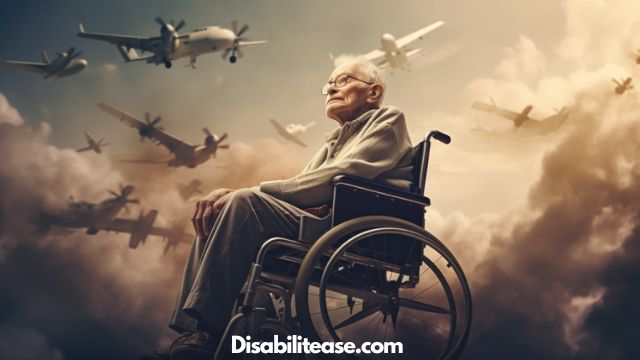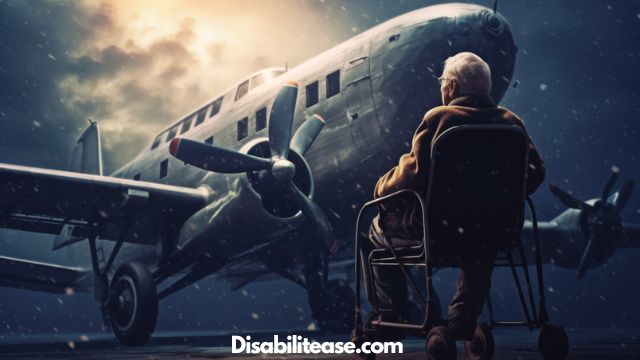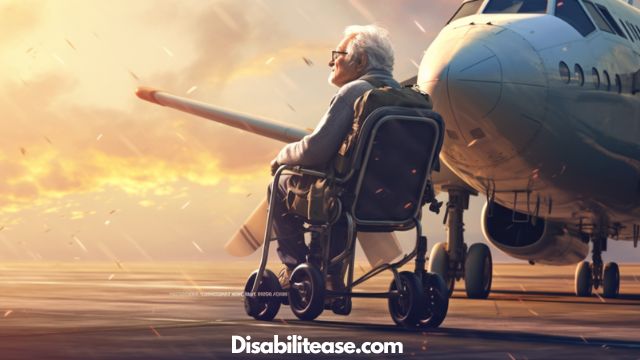Traveling can be a rewarding experience for seniors with disabilities. With the right preparation, you can make your trip enjoyable and stress-free. Here are five essential tips to help you plan your next journey.
You’ll learn how to:
- Research your destination
- Plan ahead and pack smart
- Choose an appropriate travel companion
- Have a backup plan
- Know your rights
So let’s get started!

Table of Contents
Research Your Destination
Before you go, research your destination thoroughly so you can plan for any unexpected obstacles that may arise! Look into local accessible resources such as transportation systems and wheelchair-friendly attractions.
Research assistance is available to help make sure your trip is smooth and free of stress. Ask your travel agent or airline about any special accommodations that may be necessary for anyone with disabilities.
Find out what type of accessible amenities are available in the area you’re visiting ahead of time. That way, you can make informed decisions about where to stay, eat, and explore while on vacation.
Make sure to look into accessibility standards at all destinations before booking reservations – this will ensure a safe and enjoyable experience for everyone involved!
Plan Ahead and Pack Smart
Pack smart and plan ahead for a stress-free journey! When traveling with disabilities, it’s important to make sure you plan ahead of time to ensure your comfort and safety. Preparation is key, so create a packing checklist that includes all the items you might need.
- Medication: Make sure you have enough medication for the duration of your trip, as well as any extras just in case. Also, include other medical supplies such as bandages or syringes if necessary.
- Flight scenarios: Research different flight options and scenarios that will work best for you. This could be anything from wheelchair assistance at the airport to preferred seating during the flight.
- Documents: Have all required documents such as travel insurance paperwork or passport ready before departure. It may also be helpful to carry a copy of your medical records with you in case of emergencies while abroad.
Finally, consider what type of clothing will be suitable for your journey; remember, comfort should always come first!
Choose an Appropriate Travel Companion

Choosing the right travel companion is key to making your trip go smoothly; someone who can provide backup and support if needed. As a senior with disabilities, safety concerns should be a priority when selecting a travel companion.
Look for someone who can help manage medications and other needs as well as offer physical assistance if necessary. Research resources that may be available to you while traveling such as medical attendants, airport wheelchairs, and accessible transportation from your departure airport to your destination.
If possible, find an experienced traveler with disabilities to assist you or provide guidance on where to find reliable information about accessible destinations and accommodations.
Have a Backup Plan
No matter the destination, it’s important to have a backup plan in case anything unexpected comes up during your trip. When traveling as a senior with disabilities, having an alternative plan is essential. As such, you should research alternative accommodation options and consider your accessibility needs in advance of your trip.
You may want to look into hotels that offer accessible rooms or services like Airbnb for accommodations that can better meet your needs. Additionally, it is helpful to know what alternate transportation options are available if you find yourself stranded due to mechanical issues or bad weather. |
Having a backup plan will help ensure that any unexpected incidents don’t ruin your vacation and leave you feeling frustrated and helpless.
It is also important to be prepared with the contact information of nearby medical facilities in case of an emergency, especially when traveling abroad. Lastly, make sure you have reliable contacts who can help you out if something goes wrong while on vacation.
Having multiple people familiar with your travel itinerary can provide peace of mind knowing someone has got your back if anything goes awry while away from home.
| Accommodation Options | Accessibility Needs |
|---|---|
| Hotels | Room Accessibility |
| Airbnb | Services |
| Transportation | Mechanical Issues |
| Medical Facilities | Bad Weather |
Know Your Rights

It’s important to know your rights and understand what accommodations are available to you when travelling as a senior with disabilities. Familiarizing yourself with federal accessibility laws and disability awareness can help you make the most of your travel experience.
Here are 4 key points to remember when considering your rights:
- Make sure that transportation providers, like airlines or buses, comply with federal accessibility laws by providing accessible seating and assistance during boarding and disembarking.
- Bring copies of applicable government-issued disability cards or certificates so that you can easily demonstrate proof of eligibility for any needed services.
- Be aware of lodging options that may provide accessible rooms or suites for seniors with disabilities – it’s always a good idea to call ahead if possible.
- Know what amenities are available in the area where you will be staying, such as ramps, elevators, or wheelchair-accessible pathways – this can help ensure smooth navigation around the city.
By taking the time to familiarize yourself with these issues before traveling, you can make sure that your journey is safe and enjoyable!
Conclusion
You’ve done the research, you’ve planned ahead and packed smart. You know your rights, you have a backup plan, and now it’s time to enjoy your travels!
When traveling as a senior with disabilities, having the right companion can make all the difference. It’s important to choose someone who is understanding of your needs and limitations.
With these essential tips in mind, you’re ready to embark on an unforgettable adventure! So don’t forget to take lots of pictures and make lots of memories along the way.
Happy travels!

Hi, my name is Eddie, I am a professional trainer specializing in the elderly population and I’m also a website designer. I love training in the gym, going to the beach, traveling, and having good food.
I combined my love for sport and website designing to make “DisabilitEase” whose purpose is to help elderly and disabled people live a more full and active life, have more fun, and enjoy their unique journey despite any disability.



